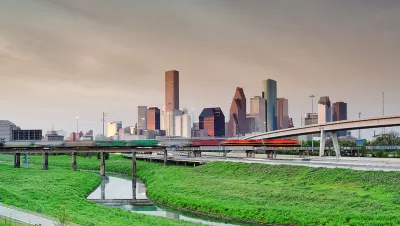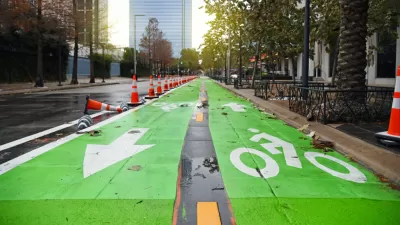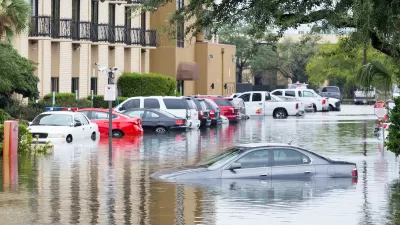The Resilient Houston initiative promises to strengthen the city's infrastructure and increase its capacity to thrive and adapt under crisis.

Luis Guajardo of Rice University's Kinder Institute for Urban Research assesses the city of Houston's progress on its 2020 "resilience strategy," adopted "to improve the capacity of individuals, communities, institutions, businesses and systems within the Houston region to not only survive any and all chronic stresses and acute shocks they might experience, but adapt and thrive."
The initiative, Resilient Houston, addresses potential "shocks and stresses" including natural disasters, public health threats, and infrastructure failures. After Texas's "short-sighted, deregulatory approach to energy policy" had disastrous effects during the recent winter storm that left millions across the state "stranded in their homes for days without power, heat, potable water and food," Houston leaders and stakeholders must redouble their efforts to build resiliency into the city's infrastructure.
Highlights of progress made in the last year include the construction of over 36,000 residential units, new incentives for property owners who install green stormwater infrastructure, and the planting of close to half a million trees.
The Institute plans to track future progress even more closely. "Later this year, the Kinder Institute will launch its Resilience and Recovery Tracker, which consolidates the recovery, mitigation and adaptation efforts of Harris County and the City of Houston on one website," and "can be used to access spending dashboards, interactive maps and thematic pages related to recovery from — and resilience to — extreme events."
FULL STORY: One year in, what progress has Houston made in its plan to build resilience?

Maui's Vacation Rental Debate Turns Ugly
Verbal attacks, misinformation campaigns and fistfights plague a high-stakes debate to convert thousands of vacation rentals into long-term housing.

Planetizen Federal Action Tracker
A weekly monitor of how Trump’s orders and actions are impacting planners and planning in America.

In Urban Planning, AI Prompting Could be the New Design Thinking
Creativity has long been key to great urban design. What if we see AI as our new creative partner?

King County Supportive Housing Program Offers Hope for Unhoused Residents
The county is taking a ‘Housing First’ approach that prioritizes getting people into housing, then offering wraparound supportive services.

Researchers Use AI to Get Clearer Picture of US Housing
Analysts are using artificial intelligence to supercharge their research by allowing them to comb through data faster. Though these AI tools can be error prone, they save time and housing researchers are optimistic about the future.

Making Shared Micromobility More Inclusive
Cities and shared mobility system operators can do more to include people with disabilities in planning and operations, per a new report.
Urban Design for Planners 1: Software Tools
This six-course series explores essential urban design concepts using open source software and equips planners with the tools they need to participate fully in the urban design process.
Planning for Universal Design
Learn the tools for implementing Universal Design in planning regulations.
planning NEXT
Appalachian Highlands Housing Partners
Mpact (founded as Rail~Volution)
City of Camden Redevelopment Agency
City of Astoria
City of Portland
City of Laramie





























